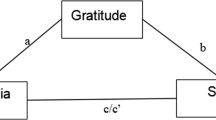Abstract
We conducted two studies investigating the relationship of gratitude to autobiographical memory of positive and negative life events. Gratitude was assessed with an attitudinal measure and college students were asked to recall both positive and negative events from their past. In both studies, a significant positive relationship was found between trait gratitude and a positive memory bias. In Study 2 it was found that gratitude still reliably predicted positive memory bias after controlling for depression. Further, it was found that a positive intrusive memory bias was associated with gratitude in both studies. Thus, an important component of gratitude may be an enhanced tendency to recall positive events from one's life.
Similar content being viewed by others
References
Beck, A. T. (1978). Depression inventory. Philadelphia: Center for Cognitive Therapy.
Blaney, P. (1986). Affect and memory: A review. Psychological Bulletin, 99, 229–246.
Bower, G. H. (1981). Mood and memory. American Psychologist, 36, 129–148.
Diener, E., Suh, E. M., Lucas, R. E., & Smith, H. L. (1999). Subjective well-being: Three decades of progress. Psychological Bulletin, 125, 276–302.
Emmons, R. A., & McCullough, M. E. (2003). Counting blessings versus burdens: An experimental investigation of gratitude and subjective well-being in daily life. Journal of Personality and Social Psychology.
Fredrickson, B. F. (1998). What good are positive emotions? Review of General Psychology, 2, 300–319.
Frijda, N. H. (1988). The laws of emotion. American Psychologist, 23, 349–358.
Grim, D. L., Watkins, P. C., Brown, A., & Whitney, A. A. (2002, June). Involuntary memory bias in depression. Presentation to the Annual Convention of the American Psychological Society, New Orleans, LA, June, 2002.
Holmes, D. S. (1980). Differential change in affective intensity and the forgetting of unpleasant personal experiences. Journal of Personality and Social Psychology, 15, 234–239.
Masingale, A. M., Schoonover, S., Kraft, S., Burton, R., Waring, S., Fouad, B., Tracy, J., Phillips. S., Kolts, R. L., & Watkins, P. (2001, December). Gratitude and post-traumatic symptomatology in a college sample. Presentation at the Annual Convention of the International Society for Traumatic Stress Studies, New Orleans, LA.
McAdams, D. P., Reynolds, J., Lewis, M., Patten, A. H., & Bowman, P. J. (2001). When bad things turn good and good things turn bad: Sequences of redemption and contamination in life narrative and their relation to psychosocial adaptation in midlife adults and in students. Personality and Social Psychology Bulletin, 27, 474–485
McCullough, M. E., Kilpatrick, S. D., Emmons, R. A., & Larson, D. B. (2001). Is gratitude a moral affect? Psychological Bulletin. 127, 249–266.
Myers, D., & Diener, E. (1995). Who is happy? Psychological Science, 6, 10–19.
Payne, D. G. (1987). Hypermnesia and reminiscence in recall: A historical and empirical review. Psychological Bulletin, 101, 5–27.
Rachman, S. J. (1980). Emotional processing. Behaviour Research and Therapy, 18, 51–60.
Roediger, H. L., & Challis, B. H. (1989). Hymermnesia: Improvements in recall with repeated testing. In C. Izawa (Ed.), Current issues in cognitive processes: The Tulane Flowerree Symposium on Cognition (p. 175–199). Hillsdale, NJ: Lawrence Erlbaum.
Schwartz, N., & Clore, G. (1983). Mood, misattribution, and judgments of well-being: Informative and directive functions of affective states. Journal of Personality and Social Psychology, 45, 513–523.
Seidlitz, L., & Diener, E. (1993). Memory for positive versus negative life events: Theories for the differences between happy and unhappy persons. Journal of Personality and Social Psychology, 64, 654–664.
Seligman, M. E. P. (1998). Positive social science. APA Monitor, 29, 4.
Strack, F., Schwartz, N., & Gschneidinger, E. (1985). Happiness and reminiscing: The role of time perspective, affect, and mode of thinking. Journal of Personality and Social Psychology, 49, 1460–1469.
Walker, W. R., Vogl., R. J., & Thompson, C. P. (1997). Autobiographical memory: Unpleasantness fades faster than pleasantness over time. Applied Cognitive Psychology, 11, 399–413.
Watkins, P. C. (2001). Gratitude: The benefits of an emotional state and trait. Spirituality and Medicine Connection, 5, 1, 6–7.
Watkins, P. C. (in press). Gratitude and subjective well-being. In R. A. Emmons & M. E. McCullough (Eds.), The psychology of gratitude. New York: Oxford University Press.
Watkins, P. C. & Curtis, N. (1994, April). Brief assessment of depression history. Presentation at the 74 Annual Convention of the Western Psychological Association, Kona, HI.
Watkins, P. C., & Ola, D. (2001, August). Gratitude and depression: How a human strength might mitigate human adversity. In R. A. Emmons (Chair), Gratitude and positive emotionality as links between social and clinical science. Symposium presented at the 109 Annual Convention of the American Psychological Association, San Francisco, CA., August, 2001.
Watkins, P. C., Porter, W. T., & Curtis, N. (1996, April). The attitude of gratitude: Development of a new measure. Presentation to the 1996 Annual Convention of the Western Psychological Association, San Jose, CA.
Watkins, P. C., Porter, W. T., and Miller, C. (1997, April). Gratitude and Subjective Well Being. Paper presented to the Annual Convention of the Western Psychological Association, Seattle, WA.
Watkins, P. C., Scheer, J., Coletti, T., & Whitney, A. A. (2002, June). The debt of gratitude: Dissociating gratitude and indebtedness. Paper presented to the Annual Convention of the American Psychological Society, New Orleans, LA, June 2002.
Watkins, P. C., Woodward, K., Stone, T., & Kolts, R. (in press). Gratitude and happiness: Development of a measure of gratitude, and relationships with subjective well-being. Social Behavior and Personality.
Woodward, K. M., Moua, G. K., & Watkins, P. C. (1998, April). Depressed individuals show less gratitude. Presentation at the 1998 joint convention of the Western Psychological Association and the Rocky Mountain Psychological Association, Albuquerque, NM.
Author information
Authors and Affiliations
Corresponding author
Rights and permissions
About this article
Cite this article
Watkins, P.C., Grimm, D.L. & Kolts, R. Counting your blessings: Positive memories among grateful persons. Curr Psychol 23, 52–67 (2004). https://doi.org/10.1007/s12144-004-1008-z
Accepted:
Issue Date:
DOI: https://doi.org/10.1007/s12144-004-1008-z




